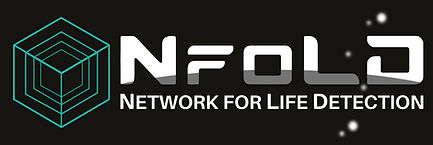
NfoLD Action Groups
Goals of NfoLD
Advance Life Detection Strategy and Capability:
Identify priorities for, and carry out, research and technology development that informs strategies and enhances capabilities for detecting evidence of life beyond Earth.
Catalyze Collaboration:
Identify research and technology objectives that may be best or only achieved through interdisciplinary collaborations; create an environment and develop activities that promote and enable new collaborations.
Support NASA Programs and Missions:
In keeping with the recommendations of the 2018 National Academies report on Astrobiology Strategy, improve the integration of life detection science and technology into all stages of planetary and astrophysical missions, from Decadal Survey and program planning to mission science definition, implementation, and interpretation.
Foster Community Development:
Increase scientific and demographic diversity in the life detection community, engage international participation, and facilitate the involvement of students and early career researchers in all aspects of NfoLD activities.
Via the conduct of their individual research projects, and by working collectively to identify knowledge gaps, the Steering Committee and broader community of researchers in NfoLD work to address Goal 1: Advance life detection strategy and capability.
Each of the three remaining NfoLD goals is reflected in a dedicated “Action Group” that is tasked with driving progress toward that goal. (Each Action Group and their current objectives are listed below.)
Action Groups include at least one Steering Committee member and one Early Career Council member but can be led or participated in by any Affiliate Member. Action groups will develop objectives, initiatives, and metrics specific to their goals, and will appoint representatives to periodically update the Steering Committee on progress of the group.
Via the Steering Committee, Action Groups can propose for use of any of the tools or funding that NASA Headquarters makes available in support of RCN activities, including support for virtual or in-person workshops.
The CATALYZE Action Group:
This action group is focused on catalyzing collaboration: identifying research and technology objectives that may be best or only achieved through interdisciplinary collaborations, and creating an environment and developing activities that promote and enable new collaborations. Among other things, this may include a forum for technology sharing, platforms for technology co-development and instrument time sharing, a portal for field sites and sample sharing, and workshops designed to spawn collaboration in key areas. The group will meet virtually on a quarterly basis at minimum, with in-person or more frequent virtual meetings as needed.
The IMPACT Action Group:
This action group is committed to impacting NASA Programs and Missions: improving the integration of life detection science and technology into all stages of planetary and astrophysical missions, from Decadal Survey and program planning to mission science definition, implementation, and interpretation, in keeping with the recommendations of the 2018 National Academies report on Astrobiology Strategy. This group will coordinate the NfoLD ‘Life Detection Forum’ as well as the development of white papers, workshops, and reference sample sets. The group will meet virtually on a quarterly basis at minimum, with in-person or more frequent virtual meetings as needed.
The ENGAGE Action Group:
This action group is devoted to engaging, expanding, and developing the life detection science and technology community: increasing scientific and demographic diversity in the life detection community, engaging international participation, and facilitating the involvement of students and early career researchers in all aspects of NfoLD activities. This group will assist the Early Career Council Activities, coordinate NfoLD mailing lists, organize job postings and student openings related to life detection, and plan relevant workshops. The group will meet virtually on a quarterly basis at minimum, with in-person or more frequent virtual meetings as needed.
Interested in joining an Action Group?
If you are not yet a member of NfoLD, please request affiliate member status here. The affiliate member application form includes an option to request membership on any of the Action Groups and/or Early Career Council.
If you are already a member of NfoLD as part of a Steering Committee research project, or have previously obtained affiliate membership status, and you would like to join one of the applications, please send us an email at [email protected] (please note: you must be a member or an affiliate of NfoLD to join an Action Group).